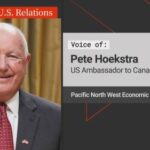In a forceful display of provincial economic advocacy, Ontario Premier Doug Ford has called on the federal government to take more aggressive action against American steel and aluminum tariffs by doubling Canada’s retaliatory measures. Speaking at a steel industry event in Hamilton yesterday, Ford emphasized the critical need to protect Canadian manufacturing jobs and supply chains facing pressure from recent U.S. trade policies.
“We can’t sit back and watch our industries get hammered,” Ford declared to applause from industry workers and executives. “The federal government needs to show some backbone and double the tariffs on American steel and aluminum imports immediately.”
The premier’s comments come amid escalating trade tensions following the Biden administration’s decision last month to raise tariffs on Canadian steel and aluminum products by 25 percent. The move has already sent ripples through Ontario’s manufacturing sector, particularly in steel-producing communities like Hamilton and Sault Ste. Marie.
Industry experts estimate that approximately 40,000 direct jobs in Ontario’s steel and aluminum sectors could be affected by the American tariffs, with potentially three times that number impacted in related industries. The Canadian Steel Producers Association reports that the province has already seen a 12 percent decline in steel exports to the U.S. since the tariffs were announced.
“This isn’t just about steel – it’s about automotive manufacturing, construction, and dozens of downstream industries that rely on affordable metal inputs,” explained Dr. Samantha Chen, economist at the University of Toronto’s Rotman School of Management. “The ripple effects through our economy could be substantial.”
Ford’s administration has announced a provincial support package of $75 million to help affected manufacturers weather the immediate impact, but stressed that federal action remains essential for a sustainable solution. The premier also proposed expediting approvals for major infrastructure projects that would utilize Canadian steel and aluminum as a way to support domestic producers.
Deputy Prime Minister Chrystia Freeland responded cautiously to Ford’s demands, stating that while “all options remain on the table,” the federal government is prioritizing diplomatic channels before considering escalation. Trade negotiations between Canadian and American officials are scheduled to continue next week in Washington.
Business leaders have expressed mixed reactions to Ford’s proposal. Jennifer Marshall, CEO of the Ontario Chamber of Commerce, warned that “doubling down on tariffs could trigger further retaliation from our largest trading partner,” while steel industry representatives have largely supported the premier’s aggressive stance.
The controversy highlights ongoing vulnerabilities in Canada’s economic relationship with the United States, where approximately 75 percent of Canadian exports are destined. Political analysts note that the federal government must balance protecting domestic industries with maintaining broader trade relationships.
As these trade tensions unfold during a U.S. election year, many wonder if short-term political calculations are driving American trade policy more than economic fundamentals. The question now facing Canadians is whether a measured diplomatic approach or Ford’s more confrontational strategy will better serve our national economic interests in an increasingly protectionist global environment.

























